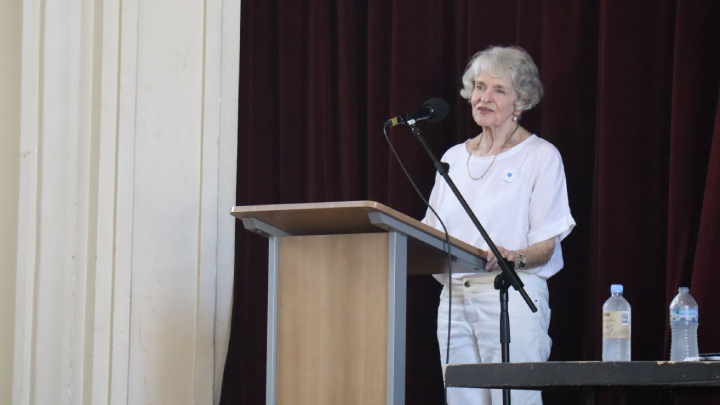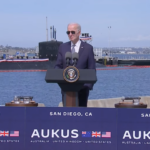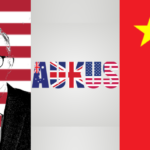“Provoking a Defensive Response From China”: AWPR’s Dr Alison Broinowski on AUKUS

The announcement of the details of AUKUS, delivered by prime minister Anthony Albanese and his US and UK counterparts in San Diego on 14 March, elevated the build-up to war with China and the goading of Xi government.
The prominent detail in the immediate reporting on AUKUS was the $368 billion taxpayer bill to be gradually spent over the next two decades, as we purchase three nuclear-powered submarines from the US and jointly build five more with technological assistance from the UK.
The deal also involves utilising nuclear technology for defensive purposes for the first time. And this will lead to the need to dispose of nuclear waste and further ensure that at least partial control of the vessels remains with our allies that build them, due to our nation’s technological gap.
And another key development involves the US and the UK increasing their nuclear-powered submarine visits to our country, until they establish a joint rotational force of these offensive, not defensive, subs by 2027, so as to tide us over in the interim prior to acquiring our own.
Greenlighting war
This uptick in the build-up to war on China has lent more urgency to the campaign to see the decision on whether to enter into an overseas conflict, a capacity known as war powers, be placed in the hands of parliament rather than the PM and a small number of ministers chosen by him.
Known as the National Security Committee, the body that decides whether Australia enters a foreign theatre of war is today comprised of nine ministers: Anthony Albanese, Richard Marles, Penny Wong, Jim Chalmers, Chris Bowen, Mark Dreyfus, Clare O’Neil, Katy Gallagher and Pat Conroy.
Australians for War Powers Reform (AWPR) is campaigning for this decision to be made by parliament, which then involves the entire nation, as each member directly represents the voices of all citizens and residents living within their constituencies.
Right now, a Labor established parliamentary inquiry into whether to make this reform is underway. However, both foreign minister Penny Wong and defence minister Richard Marles have publicly stated that the Albanese government doesn’t support the move prior to its completion.
A voice for peace
One of the most prominent voices in the war powers debate is AWPR president Dr Alison Broinowski. The former Australian diplomat warns that the details of AUKUS are slowly being drip feed to the public in order to prime it for each gradual erosion of local authority that it involves.
Alongside Greens Senator David Shoebridge and former Labor foreign minister Bob Carr, Dr Broinowski spoke at the recent War or Peace meeting in Marrickville, which saw those gathered agree there’s a dire need for a nationwide peace movement to come together and start mobilising.
Sydney Criminal Lawyers spoke to AWPR’s Dr Alison Broinowski about the lesser-known aspects of the AUKUS deal, the interim foreign nuclear-powered submarine force to be established here and the implications of our nation playing such a prominent role in the build-up to war on China.

On 14 March, PM Anthony Albanese announced the details of the AUKUS enhanced security arrangement, which, despite Scott Morrison having laid the groundwork for it in September 2021, shocked much of the nation.
Dr Broinowski, taken overall, what are the implications of the AUKUS agreement for our nation?
The media has been concentrating on the far-off, extravagantly expensive and contentious proposal for nuclear-powered submarines: that’s because it’s such a huge amount of money and it’s distracted people from other things inside AUKUS.
AUKUS is like a trojan horse. It is full of other things.
Those things that are to be delivered, and are being delivered already, include the stationing of US nuclear-armed bombers in Australia, masses more US troops on the ground and our acceptance of the US refusal to inform us about what those nuclear installations are supposed to be doing.
This is a serious derogation of Australian sovereignty.
As well as that, inside their trojan horse, we will get Tomahawk cruise missiles and more Abrams tanks, and none of those is for the defence of Australia, but we pay for them.
They’re sent to American-inspired wars in our region, making Australia more of a target than we would otherwise be.
A further serious implication of all this is the secrecy with which it’s being done. If our government was proud of what it’s achieved, it would give the Australian people the full details and the full costing and it would let people decide if they approve or not.
Instead, they’re covering it up or letting it out in dribs and drabs.
A key element of AUKUS involves our country acquiring at least eight nuclear-powered submarines. However, the US and the UK are going to initially establish a joint rotational nuclear-powered submarine force in this country by 2027 to tide us over.
Given that Paul Keating and others have suggested that the acquisition of such submarines has more of an offensive, than defensive, purpose, how do you consider this asserted need for an interim submarine arrangement?
We need to have explained to us why it is so urgent we do this. We’ve had Collins-class submarines barely functioning for decades and nobody has thought that the whole of Australia’s security and sovereignty was in danger.
What has changed? Nothing, just the rise of China, which, up until now, has not been aggressive towards us.
The only thing that China does is pushback against provocation in the East and South China Seas, which is usually done by our American ally.
So, the establishment of interim submarines in Australia is clearly offensive because they will not defend our coast. They will operate close to the Chinese mainland, not close to Australia at all.
People who believe that these will make Australia more secure should ask the government from what.
No country threatens to attack Australia, nor would these submarines operating in the South China Sea be able to deter such attack.
It is an aggressive plan designed, I fear, to provoke a defensive response from China.
The build-up to war on China and the forking out of $368 billion in taxpayer money to cover the submarines have overshadowed other aspects of the AUKUS deal, with one being that our nation is set to utilise nuclear technology in warfare for the first time.
What are the issues involved in the nation going nuclear, even if it doesn’t involve the acquisition of actual nuclear warheads?
The key figure of $368 billion arrived only weeks after an amount half of that was first quoted. That gave us the signal that the government is dribbling out the information and getting us used to it.
If there is no pushback, they will come out with something more.
Australia wouldn’t buy a used car on such terms. We still don’t know the full cost of this thing: the maintenance, the spare parts, the waste disposal, the decommissioning of these nuclear weapons, and many other things about it.
The nuclear industry has wanted to get into Australia for decades to take advantage of our uranium by developing nuclear power and, if they can from the waste, develop weapons.
AUKUS gives them partial permission to do this, with the remaining restrictions against it, likely to be eroded by future governments, unless it’s stopped.
Now the cost of establishing nuclear power in Australia – which many people say is going to cure our climate change problem and is cheap, green and clean – might even exceed the cost of AUKUS.
At least 50 powerplants would have to be established around our coast.
We already have objections to just the submarines being based at Port Kembla. Imagine how many other local governments would say, “Not in my backyard. No nuclear powerplants here.”
They know perfectly well what the risks are, and they don’t want to take them.
As well as that, we have no nuclear waste depository and we would have to find one, even for the waste we have at the moment, as well as safe transport to it.
On top of that too, the premiums for insuring such plants would have to be borne by government, as they are in other countries, at further cost to taxpayers, because the indemnity against nuclear accidents would be astronomical.
The full list of objections to a nuclear industry in Australia is well known. What I have just listed is a summary, and it can be found on many sites.
The Albanese government has established a committee inquiry into war powers. However, both defence minister Richard Marles and foreign minister Penny Wong have stated that the government won’t support the reform prior to the end of the inquiry.
Keating recently criticised the politicking of Marles and Wong in regard to AUKUS. Can we see the pair perhaps operating in a questionable manner in relation to the potential for war powers reform?
The statements made in February by the defence minister and the foreign minister about war powers reform are certainly questionable.
They appear, perhaps, to have prejudiced the findings of the very inquiry that Marles himself set up, in response to Labor’s twice-promise to hold such an inquiry, when it was in opposition.
What’s clear from their support for the existing system that Australia has had ever since federation and has led to our involvement in successive unnecessary armed conflicts, is that, unlike their Labor predecessors Calwell, Whitlam and Crean, they want it to continue. They don’t want change.
The disastrous record of our recent wars speaks for itself. In a democracy, all MPs and senators should share the responsibility for such a vital decision as going to war.
And unless the reasons for it are made clear to parliament, people who remember past wars are going to oppose any proposals for another one.
Beyond war powers, both majors have been making some rather serious decisions around going nuclear and entering into enhanced security pacts without any consultation whatsoever with the nation.
So, is there need for more reform beyond the war powers question in terms of defence?
That’s an important issue that people haven’t been talking about, so thank you for raising it.
With the advent of AUKUS, we in Australians for War Powers Reform have become quite concerned about the treaty process, which is as lacking in transparency, as is the way in which the executive decides to send troops to war.
Treaties last even longer than most wars, of course, and if the AUKUS so-called agreement is transformed into a treaty, we could have the consequences of it forever.
And lastly, Dr Broinowski, you spoke at the War or Peace meeting in Marrickville two weeks ago. It marked the 20 year anniversary of the commencement of the war in Iraq.
The debate at the meeting was around whether our nation should again be following the United States into a war based on lies: this time the assertion being that Beijing is a rising threat to our nation.
A key difference in the present though, is Australia is taking a much more prominent position in the build-up to war with China. So, can you comment on what this heightened role could mean for our nation?
In past wars, Australia was in the habit of making a minimal commitment to some coalition, usually as a gesture to the US alliance. But anti-China propaganda has been building up in Australia since at least 2018.
This is intended, I’m sure, to soften public resistance to a war that is planned and that is coming.
The recent Red Alert series in our media was intended, it seems to me, to put Australia out in front of containing China – out in front of the United States even.
There are three problems with that. We could lose a war with China. And we would lose a war with China and so would the United States. That is point one.
We live in this region, which the US does not. That’s point two.
We don’t have an independent foreign or defence policy. We need to catchup with our neighbours on that, not threaten them.
So, we don’t need to confront China. China is not our enemy. But we do need to put all of our resources and diplomatic concentration on getting on with it, just as our trade minister is now trying to do.







